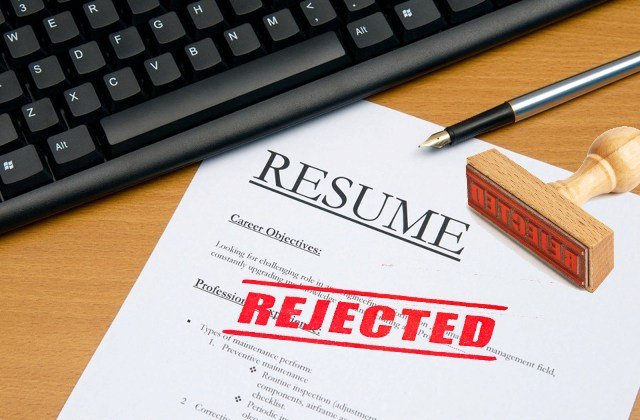10 Reasons Why Your CV Is Getting Rejected

Are you sending out many CVs but never seem to get a positive response? Look, let’s start by admitting the hiring process is an imperfect and sometimes unfair science. Companies could see hundreds of resumes for a single opening, and since time is of the essence hiring managers have no choice but to quickly weed out the resumes they initially deem unfit. That means you could very well be the perfect person for the job, but if your resume isn’t packaged correctly or if you have a glaring error on it, you won’t even get a chance to prove it.
Prospective employers will readily reject a CV if it doesn’t meet their requirements and – unfortunately – the vast majority of applications have the following 10 common mistakes…..
1. Meaningless Introductions
A snappy introduction should mention which industries you have excelled in and what skills you would bring to your new role. Don’t waste this chance to impress by just rolling out some meaningless soundbites. And always take the time to make the introduction bespoke to the role that you are applying to.
2. Lack of Contact Details
It can be infuriating is when you have a really good candidate, only to find that they have misspelt their email address or puts the wrong digits down on their phone number, making it impossible to contact them. Double check your details. You’d be amazed at just how many CVs we get through from viable candidates who have inaccurate contact details and are probably flummoxed as to why they are not getting any interviews!
3. Unexplained Employment Gaps
In this age of layoffs, staff reduction and redundancy, employment gaps are likely to be something that a lot more people will have on their CV than ever before. If this is you, the easiest way to trip yourself up is to stretch the job dates to cover an employment gap, but beware, as previously mentioned, more and more employers are doing checks to ensure that what a candidate puts on his CV rings true.
4. Long Paragraphs
Put yourself in the shoes of the recruiter. They want a nice punchy CV that quickly gives them all the info they need, they don’t want to plough through long paragraphs, nor will they probably have the patience to do so. Your CV needs to be easy for the reader to scan and it should quickly get to the important meaty bits regarding your job history, skills and accomplishments.
5. Misleading Information
More and more businesses are now carrying out extensive background checks prior to taking somebody on board. Nearly everybody embellishes their achievements in jobs on their CV, but stretching the truth could land you in hot water. Many candidates trip themselves up, with the most common misleading information being put on CVs.
6. Weird Fonts
We get so many CVs where people go a bit ‘artistic’ and use 5 different fonts in all the colours of the rainbow. The golden CV rule is to keep to one single easy to read font like Calibri, Arial or the newspaper font of choice, Times New Roman and to keep the font black. Avoid those hard to read fonts like Blackadder ITC or ugly fonts like Comic Sans. And try and keep the font size to at least 10. Reducing the size to 8, it probably indicates that your CV is too busy.
7. Spelling & Grammar
No real excuses for this, but it’s amazing the amount of CVs that come through littered with spelling mistakes and poor grammar. We have even seen the misspelling of Curriculum Vitae itself. Try and remember that this is a document that represents you and mistakes will reflect incredibly badly.
8. A Ridiculous Email Address
You may be a fan of Alan Partridge, but do you need really need to use this simply daft email address – [email protected]? Email addresses like this should be kept for private use. It takes 5 minutes to set up a ‘professional sounding’ email address via Hotmail, Yahoo, Google or any of the other free email providers.
9. Your Online Reputation Is Bad
According to a recent survey by BeHiring, 68% of hiring managers will look you up on Facebook. That means even if the resume you submit is decent, you also have to be aware of what’s going to show up about you on a Google search. Or Facebook, Twitter, and Instagram. If an image search of your name returns a picture of you doing a keg stand or your Instagram account is nothing but duckface selfies, there’s a good chance you’ll be taken out of the running right then and there. Clean up your online reputation before submitting your resume.
10. Contains Unnecessary Information
Leave out the fluff and focus on what really matters, because people are busy and you need to get their attention quickly. Well, the same goes for resumes. Advice varies greatly in this area and the length of the resume will depend somewhat on the job in question, but generally one page for every 10 years of work experience is the standard to which many stick. But whether you do one page or two, don’t go far beyond that because with hiring managers taking only 5 to 7 seconds to read your entire resume, you need to make a concerted effort to only include the things about which they care.




